Welcome to the March 2019 edition of the Curious Tea subscription! Let’s look at the four exciting new teas we’re sharing with our subscribers this month.
The first light tea this month is a vibrantly verdant ‘deep steamed’ Makinohara Fukamushi Sencha green tea from Japan.
The second light tea is an exquisite and unusual Darjeeling Emerald green tea from Rohini Tea Estate that is made from green tea clones specially selected for minimal tannin content.
For the dark side of the selection we have another tea from Darjeeling, a 2018 First Flush from the renowned Thurbo Tea Estate, that has a classic floral and mineral character.
Finally, the last tea we are featuring this month is a Shui Xian Oolong from Taiwan, a tea that has a floral and roasted profile and imitates a famous Chinese oolong.
- Light: Makinohara Fukamushi Sencha and Darjeeling Rohini Emerald;
- Dark: Darjeeling Thurbo First Flush 2018 and Shui Xian Water Sprite Oolong;
- Mixed: Makinohara Fukamushi Sencha and Darjeeling Thurbo First Flush 2018.
Our Discovery subscription boxes contain 10g taster pouches of all of the above mentioned teas. If you are a subscriber you will benefit from a 10% discount on all teas from our tea shop!
Let’s get into further detail on the products featured in our March tea subscription boxes.
Makinohara Fukamushi Sencha
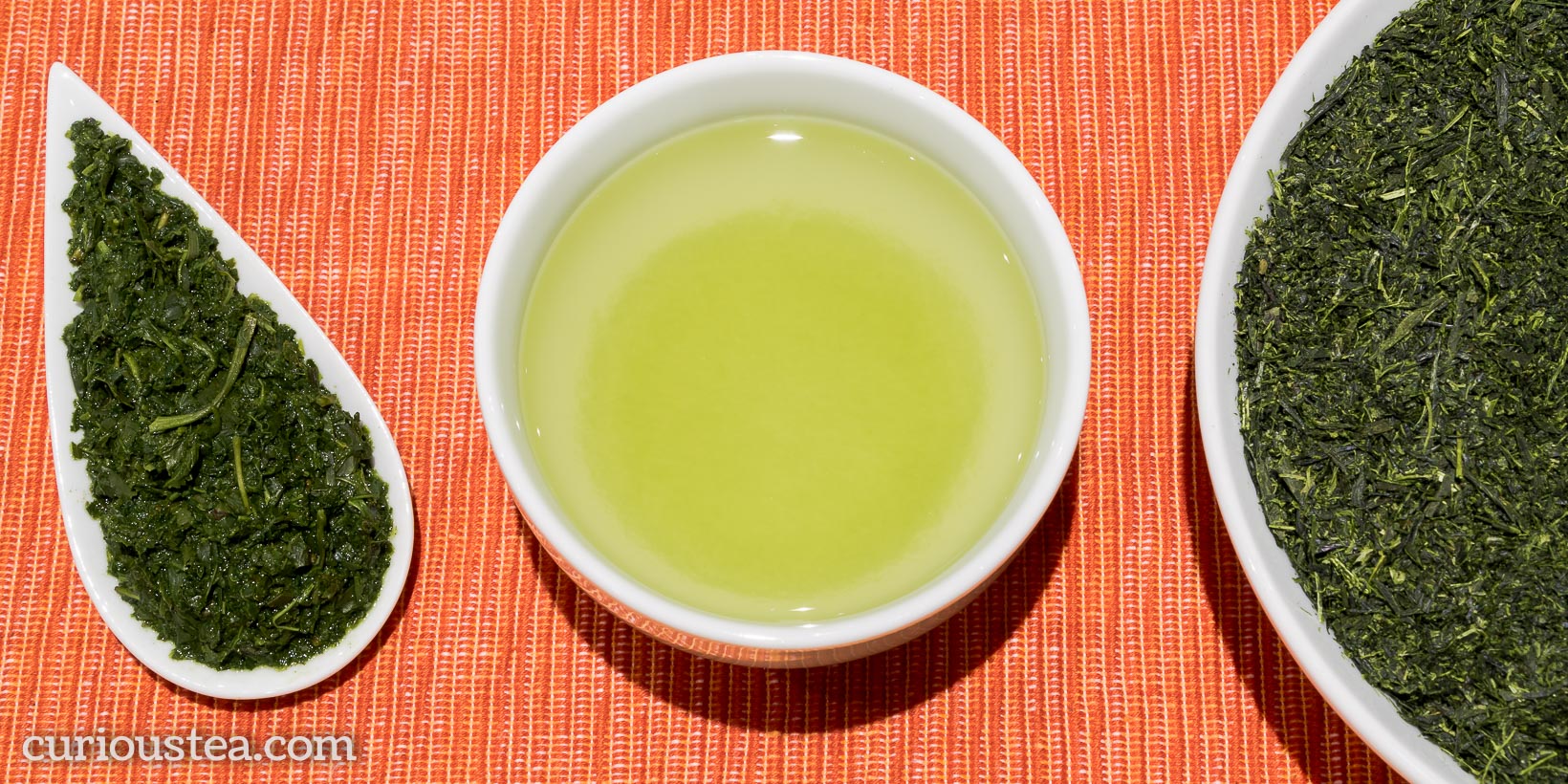
Makinohara Fukamushi Sencha (深蒸し煎茶) is a green tea from Japan that undergoes ‘deep steaming’, a process that imparts a character that is more complex and sweeter than other conventional sencha green teas. Grown at low altitude around Makinohara in Shizuoka Prefecture, it is made from the Yabukita (やぶきた) cultivar. This particular batch is a second flush tea, harvested in May 2018. It is also a partially shaded tea (similar to gyokuro) that is shaded for 5 days prior to plucking to concentrate the flavour in the leaves. Like all of our Makinohara Japanese teas, we source it directly from the grower in Shizuoka.
This Makinohara Fukamushi Sencha, like most Japanese green teas, is steamed rather than pan roasted. However it is rather more special as it undergoes a lengthier steaming process, referred to as ‘deep steaming’. In Japanese, this lengthier steaming is called fukamushi (深蒸し), where the tea is steamed for 1-2 minutes as opposed to the usual futsuumushi (普通蒸し) steaming, which is only 30 seconds to 1 minute. There is also an even lighter version that is called asamushi (浅蒸し) or ‘light steamed’ tea, which undergoes steaming for less than 30 seconds. Even though gyokuro, kabusecha and even bancha can be deep steamed, it is usually senchas that undergo such treatment.
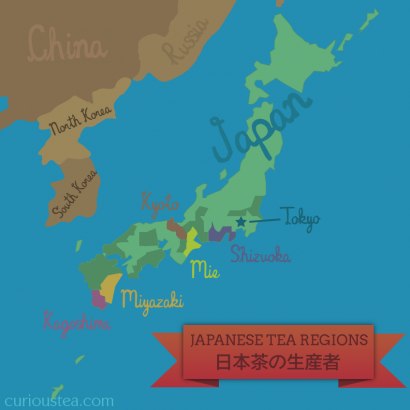
This longer kill-green steaming process makes quite a big difference to the flavour of the tea. It diminishes astringency and increases sweetness, resulting in a good balance between the classic umami depth and a pleasing sweet aftertaste. The steaming process makes the tea leaves very soft, so during the next processing stage, which is rolling, the leaves will often break. This results in variable leaf size, with many very small broken leaf fragments. It can appear like a low-quality sencha, but the reality is completely the opposite as it the result of the specialised deep steaming process.
When brewed, fukamushicha also has a stronger, more vibrant, green color, with a cloudy liquor and visible sediment. There are Japanese teapots specifically designed for brewing fukamushicha, which have a finer brewing mesh and a larger surface area so that it doesn’t get clogged with the fine tea particles. We recommend using a very fine mesh infuser if you have one. On the plus side, having fine particles in your tea can increase the health benefits, as you will be consuming more leaves (and their catechins, fibre, vitamins, and chlorophyll), very much akin to matcha drinking!
The leaves of this Makinohara Fukamushi Sencha are dark green in colour, mostly formed of smaller broken leaves and particles. This is the direct result of the deep steaming process. To achieve a more balanced taste we suggest a lower brewing temperature and shorter infusion time as the smaller leaf releases more flavour, more quickly. This Fukamushi Sencha produces a vibrant green liquor with a grassy aroma. The liquor itself is cloudy, due to the fine particles. The flavours are smooth, both sweet and savoury with a herbaceous, grassy profile. There are umami notes of kombu seaweed. The aftertaste is long lasting and verdant. Overall this tea delivers the typical complex savoury grassy flavours while maintaining a finely balanced character thanks to those sweeter notes.
Makinohara Fukamushi Sencha is best brewed at 70°C for 1-2 minutes, with multiple infusions.
You can also buy Makinohara Fukamushi Sencha green tea in our online shop.
Darjeeling Rohini Emerald
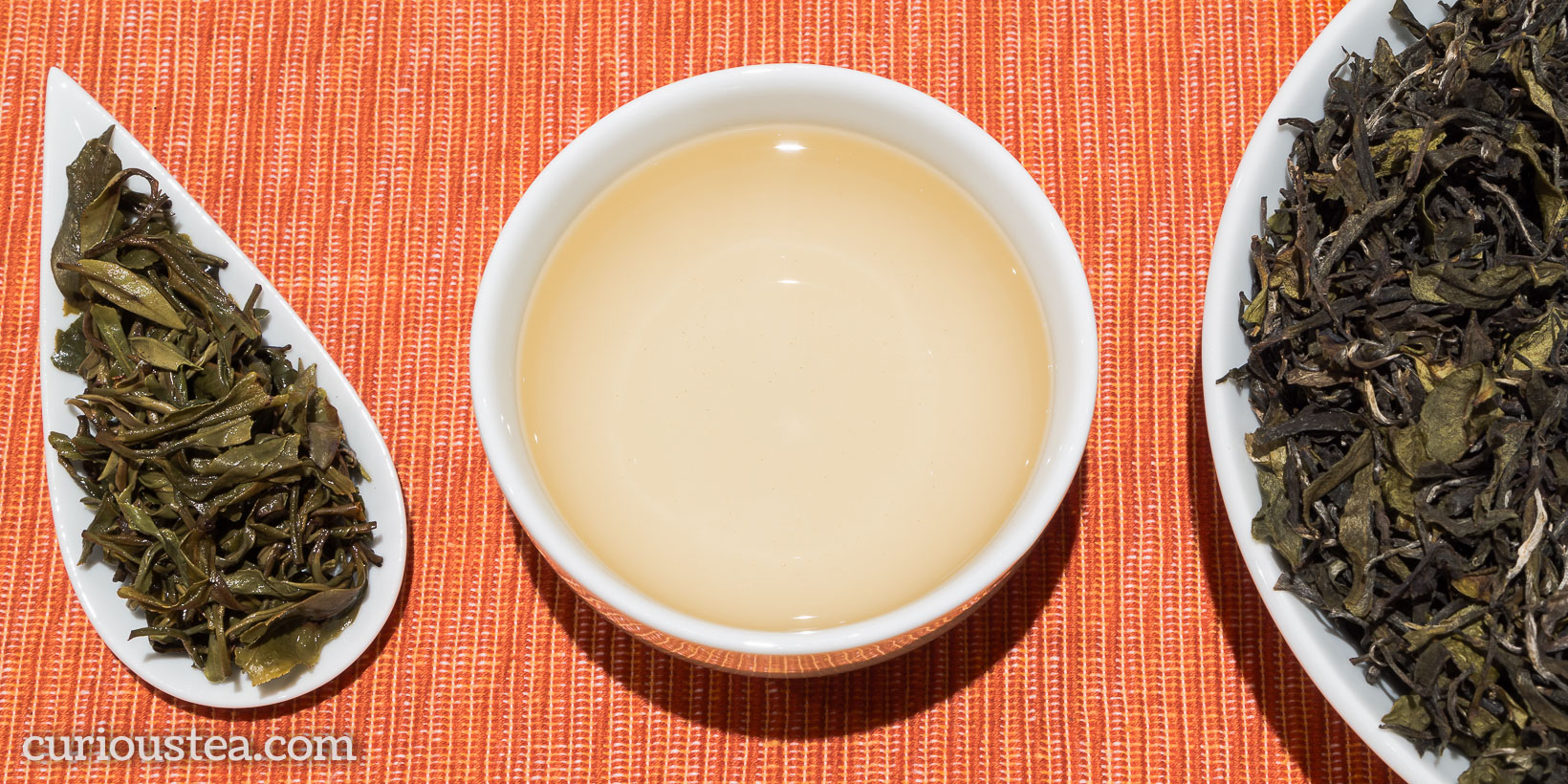
Darjeeling Rohini Emerald is a complex green tea from the Rohini Tea Estate. Made from specially selected tea plants, it has a smooth character with a fruity and vegetal profile. This tea, that is also known as Vintage Green, consists of select fine leaves, mostly comprising of two leaves and a bud. Like all our Rohini and Gopaldhara teas, we source it directly from Rishi Saria, the owner and director of Gopaldhara and Rohini Tea Estates. This lot is from the March 2018 harvest.
Rohini Tea Estate is located along the route that connects the towns of Siliguri and Kurseong. Surrounded by beautiful natural environment this estate produces tea from relatively young trees. The estate has had a chequered past, not actually producing any tea for a long period of time. Recently it has been replanted with young tea trees, which sometimes has lead it to be called the youngest tea estate in Darjeeling. It is now going from strength to strength and is producing more and more interesting and quality teas. This green tea is a great example of what these new tea trees are capable of.

It is particularly worth noting that this tea is made from green tea clones that have been specifically selected to have much lower tannin content. This is immediately evident when comparing it to other Darjeeling green teas. Most of these green teas tend to exhibit a character that has a degree of astringency present and often have a savoury, smoky edge. By contrast this tea has very little astringency and instead features a light yet complex character full of fruity and lightly vegetal notes.
This exquisite Darjeeling Rohini Emerald has wiry tippy leaves consisting of one bud plus 1-2 leaves. The liquor produced has a golden colour and a light vegetal aroma. The taste is superbly smooth, with just a touch of dryness. The vegetal and fruity profile has notes of blackcurrant leaves, stewed fruits and fennel. There is a tangy note present that makes us think of a forest berry compote. The aftertaste is clean and refreshing, providing a perfect finish to the taste. Overall this is a very unusual green tea from Darjeeling of supreme quality and a sure must-try!
This tea is best brewed at 80°C for 2-3 minutes and can be brewed multiple times. When experimenting with repeated steepings, you can gradually increase the water temperate and steep time to extract fuller flavour.
You can also buy Darjeeling Rohini Emerald green tea in our online shop.
Darjeeling Thurbo First Flush 2018
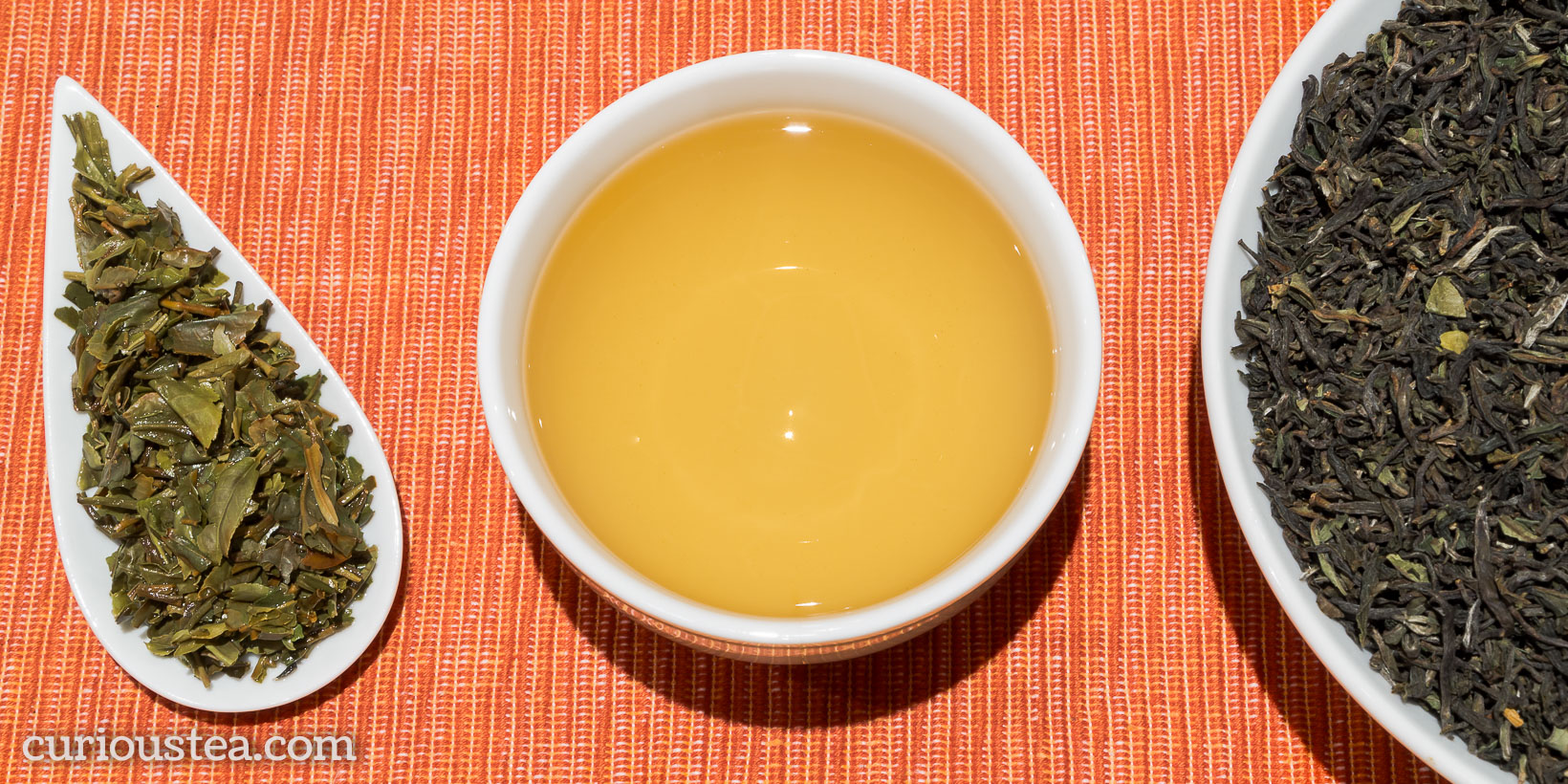
Darjeeling Thurbo First Flush 2018 is a top grade early spring Darjeeling tea that is floral and smooth. It is a fantastic example of a First Flush Darjeeling, having floral and mineral notes with a long-lasting smooth aftertaste.
This tea comes from a tea estate that is located in the beautiful Mirik Valley of western Darjeeling, very close to the Nepalese border. The estate is well-known for clonal teas, where the bushes are grown from cultivars originating from the original plants brought from China rather than from tea seeds. This imparts a distinct floral flavour and bright quality to these highly sought after teas.

The name of Thurbo Tea Estate most likely originates from the time the British had set up camp in this area prior to invading Nepal. In local language, ‘tombu’ means tent and was used to refer to this camp, which probably became Thurbo with time. The estate itself was established in 1872 and is one of the larger estates in Darjeeling.
This Darjeeling Thurbo First Flush 2018 is really top quality; the neat tippy leaves producing a bright golden aromatic liquor. The character is typically first flush, with floral and mineral notes being the highlights. The profile is smooth and balanced with hardly any astringency or dryness. There are floral, fruity, mineral and creamy notes and a long-lasting floral aftertaste that is quite comforting. An excellent tea to enjoy on its own or as part of an afternoon tea paired with scones, clotted cream and strawberry jam.
Darjeeling Thurbo First Flush 2018 black tea is best brewed at 90°C for 3-4 minutes according to your taste. It can also stand at least one more infusion. Best taken without milk to fully enjoy the first flush character and complexity of flavours of this fine tea.
You can also buy Darjeeling Thurbo First Flush 2018 black tea in our online shop.
Shui Xian Water Sprite Oolong
![]()
Shui Xian Water Sprite Oolong (水仙烏龍茶) is a an expertly roasted take on a classic Wu Yi Shan Shui Xian Oolong. Utilising a local Taiwanese cultivar this ‘Water Sprite’ or ‘Narcissus’ oolong undergoes light oxidation and medium baking to carefully showcase a balance of floral and roasted notes in a nod to the Chinese classic Shui Xian tea. Sourced by us from the Tea Master who carries out the roasting process, this tea was harvested and baked in April 2018.
This tea is named after the famous Shui Xian Oolong from Wu Yi Shan that is renowned for an orchid aroma and a floral, roasted character. This name actually refers to the specific Shui Xian cultivar that is used in producing these teas. Our tea shop features a Lao Cong Shui Xian as well as versions from other regions, such as Dan Cong Shui Xian and the highly unusual Zhang Ping Shui Xian that comes pressed into square cakes. Unlike these teas from China that all utilise the Shui Xian cultivar, this Taiwanese version is made using a local ‘Four Seasons’ Si Ji Chun cultivar. Si Ji Chun (四季春), which translates as Four Seasons Spring in full, first appeared in Taiwan in the 1980’s. It favours low altitude conditions and provides farmers with a consistent crop throughout the whole year. The leaves that are plucked from Si Ji Chun plants have a fresh and light flowery aroma year round, perfect for producing expressive teas.
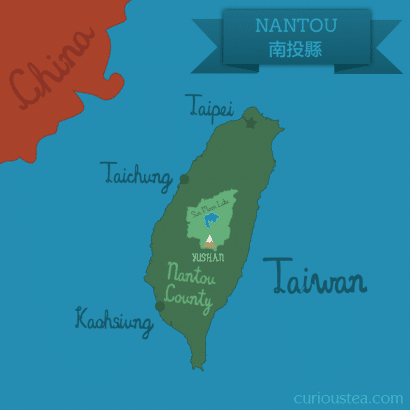
Shui Xian Water Sprite Oolong utilises the leaves of the Four Seasons cultivar that are lightly oxidised (15-20%) and are then expertly roasted. Consequently the underlying aromatic floral notes of this cultivar are perfectly balanced with the roasted profile. This interplay of flavours achieves a character that is highly reminiscent of Shui Xian oolong teas from China. This tea is a great showcase of the skills of the Tea Master as she was able to achieve an imitation tea that, in our opinion, outshines many versions of the original – especially considering the price!
This oolong has dark twisted leaves with a roasted aroma. It produces a golden liquor with a floral and roasted aroma. The smooth and tangy taste has a similar floral, roasted profile. The complex processing also brings out some lovely notes of honey, wheat and fruits. It has a refreshingly smooth character with a lasting tangy fruity aftertaste. Roasted mineral top notes at the very finish complete the rounded, complex taste.
This Shui Xian Water Sprite Oolong is best brewed at 90°C for 3-4 minutes according to your taste and can be brewed multiple times.
You can also buy Shui Xian Water Sprite Oolong tea in our online shop.
We really do hope that you enjoy the tea selection for March and are looking forward to the next selection in our April box!
If reading this has made you curious about our teas, but you don’t yet subscribe to a monthly tea selection, you can sign up for our tea boxes in just a few clicks. We ship worldwide from London, UK.
We always love to hear from you, so if you have any questions, suggestions or just want to chat about tea, email us at contact@curioustea.com, via our Facebook page or via Twitter.
You can also follow us on Instagram for pretty tea photos.
Happy tea discoveries!

